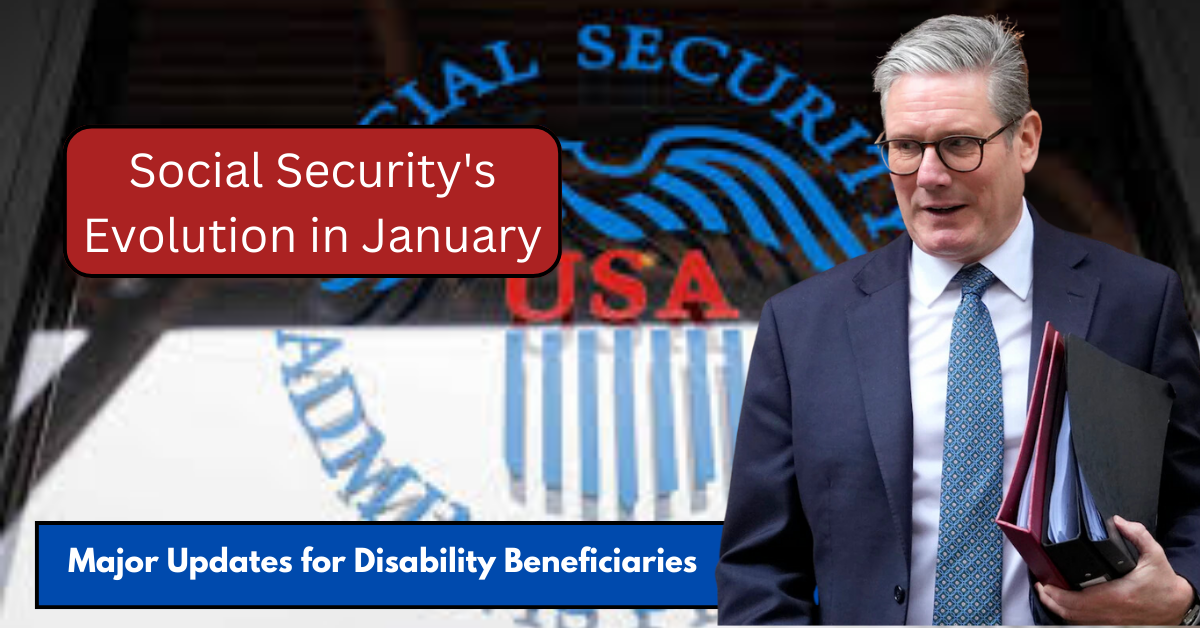Navigating Social Security can be challenging, especially for disability beneficiaries who rely on these benefits for financial stability. With updates planned for 2025, it’s vital to understand what’s changing, who’s affected, and how you can stay ahead to secure your benefits.
This article explains key updates for Social Security disability beneficiaries in 2025, highlighting changes, challenges, and actionable steps to adapt.
Social Security Alert
| Topic | Details |
|---|---|
| COLA Increase | 2.5% adjustment in 2025 to offset inflation. More info |
| SGA Threshold | Rising to $1,620 (non-blind) and $2,700 (blind) per month. |
| Trial Work Period (TWP) | Monthly earnings cap increased to $1,160. |
| Student Income Exclusion | Up to $2,350 monthly; annual limit $9,460. |
| Who Is Affected? | Beneficiaries earning above limits or failing to meet updated criteria. |
Key Changes to Social Security in 2025
1. Cost-of-Living Adjustment (COLA)
The Social Security Administration (SSA) announced a 2.5% COLA increase to help offset inflation. Here’s how it affects payments:
- Average SSDI payment: Rising from $1,542 to $1,580 per month.
- Maximum SSI payment: Increasing from $943 to $967 per month.
While this adjustment offers some relief, rising healthcare and housing costs remain a concern for many beneficiaries.
2. Substantial Gainful Activity (SGA) Thresholds

The SGA limit, which determines how much income a beneficiary can earn while still qualifying for benefits, will increase in 2025:
- Non-blind individuals: $1,620/month.
- Blind individuals: $2,700/month.
Exceeding these limits may result in a loss of benefits, making it crucial to monitor earnings carefully.
3. Trial Work Period (TWP)
For beneficiaries testing their ability to return to work, the TWP allows higher earnings without losing benefits. In 2025, the monthly limit for TWP will increase to $1,160. Beneficiaries should track these months to avoid surprises.
4. SSI Student Income Exclusion
For students receiving SSI, 2025 brings higher exclusions:
- Monthly income exclusion: $2,350.
- Annual limit: $9,460.
This encourages young beneficiaries to pursue education and part-time work without reducing their benefits.
5. Potential Legislative Reforms
Discussions about Social Security reforms continue. While no major changes are confirmed, possible adjustments could include retirement age increases and updated funding methods. Beneficiaries should stay informed about these developments.
Why Some Beneficiaries May Lose Out?

Despite these updates, not everyone will benefit. Here’s why:
1. Income Disqualifications
Beneficiaries earning above the new SGA thresholds risk losing eligibility. For example, a non-blind individual earning $1,700/month in 2025 will exceed the limit.
2. Non-Compliance with Reporting Requirements
Failing to report changes in work status or income can lead to overpayments and loss of benefits. The SSA conducts periodic reviews to ensure compliance.
3. Legislative Gaps
Some groups, such as dependents of deceased beneficiaries, may not benefit from updates. Advocacy efforts continue to push for more inclusive reforms.
Steps to Protect Your Benefits

Follow these practical steps to ensure your benefits remain secure:
1. Track Your Earnings
Use tools like the SSA’s Work Incentives Planning and Assistance (WIPA) program to monitor income and avoid exceeding thresholds.
2. Report Changes Promptly
Notify the SSA of any changes in work status, income, or household composition to avoid penalties.
3. Seek Professional Guidance
Consult with a Social Security attorney or advocate to understand rules, navigate appeals, and prepare for legislative changes.
4. Use Work Incentives
Programs like Ticket to Work provide resources like vocational training and job placement to help beneficiaries explore employment opportunities.
5. Stay Informed
Subscribe to updates from reliable sources like the SSA or advocacy groups to stay ahead of policy changes.
6. Take Advantage of Educational Resources
Local workshops and consultations from organizations like Disability Rights Advocates can provide valuable guidance.
Frequently Asked Questions

1. What happens if I exceed the SGA threshold?
Exceeding the SGA could result in a loss of benefits, but programs like the Trial Work Period provide a temporary safety net.
2. Will the COLA increase fully cover inflation?
The COLA adjustment helps but may not entirely offset rising costs. Beneficiaries should budget accordingly.
3. How can students maximize their benefits?
Students can take advantage of the increased SSI Student Income Exclusion by working part-time and keeping detailed records.
4. Are resources available to help understand these changes?
Yes, the SSA website, local advocacy groups, and professional advisors offer detailed guidance. Programs like WIPA can provide personalized assistance.
Conclusion
The changes to Social Security in 2025 bring both opportunities and challenges. By staying informed, tracking income, and seeking professional advice, beneficiaries can navigate these updates and protect their financial stability. Staying proactive is the best way to ensure uninterrupted support.
This article has been carefully fact-checked by our editorial team to ensure accuracy and eliminate any misleading information. We are committed to maintaining the highest standards of integrity in our content.
Premlata is a seasoned finance writer with a keen eye for unraveling complex global financial systems. From government benefits to energy rebates and recruitment trends, she empowers readers with actionable insights and clarity. When she’s not crafting impactful articles, you can find her sharing her expertise on LinkedIn or connecting via email at biswaspremlata@gmail.com.









